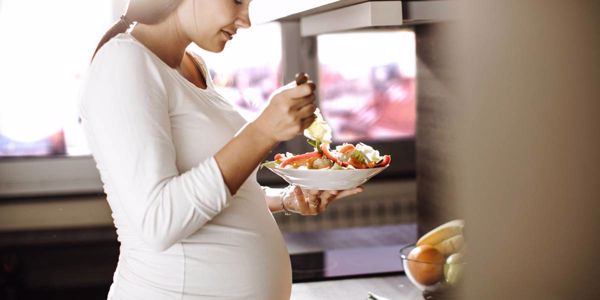It is important to remember that it is normal and essential for all women to gain some weight during pregnancy. Weight gain is needed for your growing baby, the placenta and amniotic fluid. It also helps you store some extra fat to make your breast milk once your baby comes along.
During your pregnancy you need to focus on a nutrient dense diet to meet the needs of important vitamins and minerals such as calcium and iron. It is important you do not over eat and gain too much weight during pregnancy to help outcomes for both you and your baby as this can cause an increased risk of gestational diabetes, high blood pressure and pre-eclampsia.
Eating delicious meals and snacks is one of life's greatest joys and you should focus on including a wide range of nutritious tasty foods into your diet. Pregnancy is not the time to diet and therefore don't go hungry or skip meals as you and your baby need enough nutrition. In general try and limit foods higher in fat and sugar but don't feel guilty if you eat the occasional treat. We should honour our hunger cues and appreciate when our appetite is higher some days and lower on others, you know your body better than anyone else!
How Much Weight Should I Put On In Pregnancy?
There are no official UK guidelines for weight gain but you could use the 'one, two, three' idea from the American Guidelines which are based on your pre-pregnancy BMI, to give you a rough idea of what you should expect to gain during the whole of your pregnancy:
BMI >25 before pregnancy - should gain about 1 stone / 6 kg
BMI 18.5-25 before pregnancy - should gain about 2 stone / 12kg
BMI <18.5 before pregnancy - should gain about 3 stone / 18kg
Women averagely gain between 10-12kg in pregnancy with most weight being put on after week 20. However, it is important to remember that these are just loose guidelines which are quite outdated and every pregnancy is so individualised. Try not to fixate on how much you weigh or to be measuring it regularly as this can often be unhelpful. Worrying too much about your weight gain can create pregnancy related anxiety which can in itself have negative effects for you and your baby. If there are any concerns with your weight during your pregnancy, this can be picked up by your midwife or GP and they may ask you to see a Registered Dietitian if you need any extra help.
Staying fit and active during pregnancy will help you adapt to your changing shape and help to cope with labour. Keep up your normal daily physical activity or exercise (e.g. gentle running, pre-natal yoga, swimming, dancing, or even walking to the shops and back) for as long as you feel comfortable. See my article on "How can I eat healthily in pregnancy?" for more information on healthy eating in pregnancy.
References:
B Thomas, J Bishop. Manual of Dietetic Practice (2011) 4th Edition. Blackwell publishing. Chapter 3.1, Pregnancy
Institute of Medicine. Weight gain during pregnancy: reexamining the guidelines. Washington, D.C: The National Academies Press; 2009. [Google Scholar] Accessed July 2020.
National Health Service (NHS) [Internet]. Burnley, UK: Department of Health. https://www.nhs.uk/start4life/pregnancy/healthy-eating-pregnancy/ Accessed July 2020
NICE (2010) Weight management before, during and after pregnancy. Public health guideline 27. Available at: https://www.nice.org.uk/guidance/ph27/chapter/1-Recommendations#recommendation-2-pregnant-women Accessed July 2020.
BDA (2019) Pregnancy & Diet. British Dietetic Association Food Fact sheet. Available at https://www.bda.uk.com/resource/pregnancy-diet.html. Accessed July 2020







